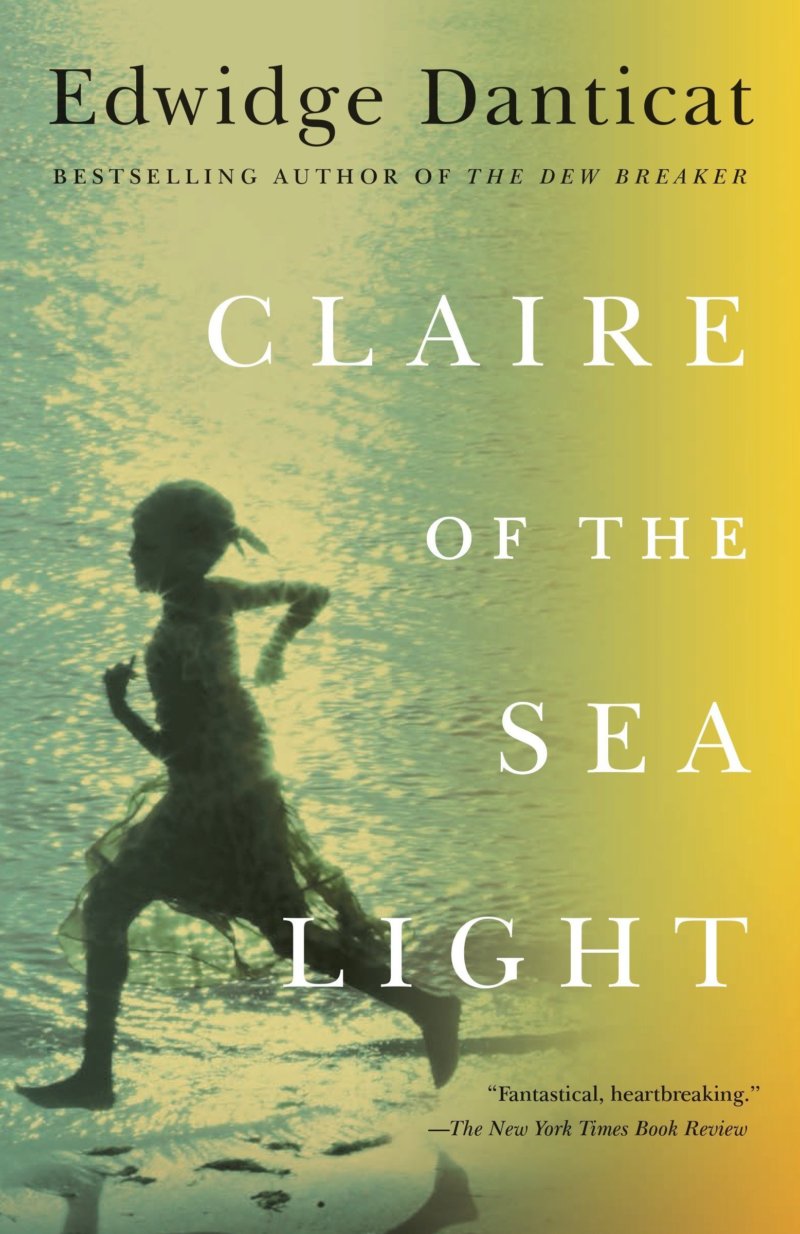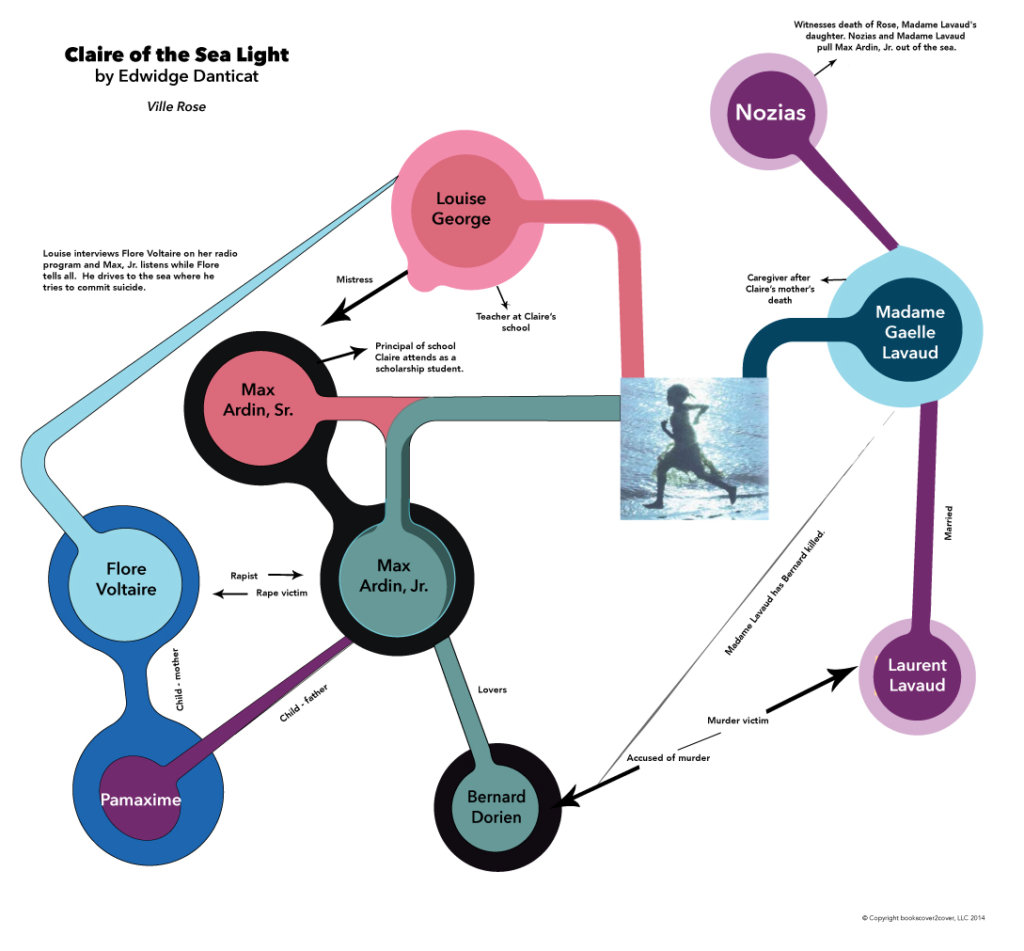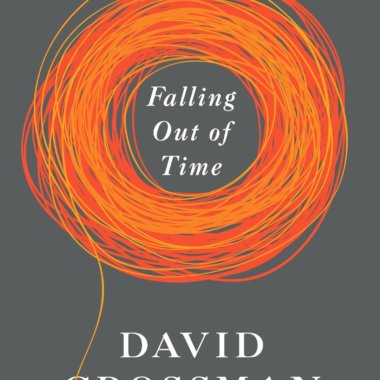The setting of Claire of the Sea Light by Edwidge Danticat is a fishermen’s town on the coast of the Caribbean Sea, twenty miles from Port-au-Prince, Haiti. Here, in the fictional town of Ville Rose, the poor live in clapboard shacks on the edge of the sea, while the rich—a very small percentage of the town’s 11,000 population—reside in gated two-story mansions in the Anthère Hill section near the lighthouse, below Mòn Initil, or Useless Mountain. In the opening scene, Nozias walks toward his sloop, hears the low rumbling, and sees in the distance a ten- to twelve-foot wave pummel his good friend Caleb’s boat Fifine, sinking it and the man. On the morning Caleb dies, Claire Limyè Lanmè Faustin is seven years old, and she and her father Nozias visit the cemetery in which her mother Claire is buried. The daughter and father have performed this ritual every year since she was three, in memory of her mother’s death in childbirth. It is the “day of both life and death.”
The main characters in Claire of the Sea Light are seven in number, and each of them carries the full human weight of a larger story no less potent than that of Nozias and Claire. The other five characters—Madame Gaëlle Lavaud; Bernard Dorien; Max Ardin, Junior; his father Max Ardin, Senior; and Louise George—implicate one another in a web-like nexus of competing needs: consolation, relief, resentment, and revenge. Emerging from this interconnection is a complex story imaginatively rich in the structural underpinnings of Danticat’s sublimely written novel.
Nozias and Claire form the father-daughter dyad that completes the stories of the other five characters. As a dyad, Nozias and Claire are connected through his wife’s death: The child is a “revenan…who had entered the world just as her mother was leaving it.” Nozias is forewarned: he must sever Claire from the place where she is born lest she “spend too much time chasing a shadow” she “can never reach.” He takes her to his wife’s relatives in the mountains and does not see her for three years. While she is away, he lays a dress his wife had made for Claire’s first birthday “across his chest at night, as he might have done with the child if she were with him.” On her third birthday, he sends for her.
Over the years that Claire lives with his wife’s relatives, Nozias wonders how he will care for his daughter. Although he has a good heart and loves her, he is poor and feels he would make “so many hopeless mistakes.” He remembers how he carried his newborn in his arms to Madame Gaëlle Lavaud’s house just a short time after his wife’s heart had suddenly stopped toward the end of her labor. A woman of means and the owner of the only fabric store in town, Madame Lavaud will know why he has come. She has been nursing her three-year-old daughter Rose and has sufficient milk for the newborn. Madame Lavaud invites them in and unbuttons “a silk blouse, making no effort to shield her large breasts.” From this moment on, Madame Lavaud’s story is intimately linked to the father-daughter dyad.
Madame Lavaud is Nozias’ choice to be Claire’s surrogate mother. After all, she is the only woman who has nursed his daughter. She is also rich and lonely, ever since her daughter Rose died in a motto taxi accident when Rose was seven years old—an accident Nozias witnessed. Every year he inquires if Madame Lavaud will take Claire. Every year she declines. But on Claire’s seventh birthday—the day of Caleb’s death—Madame Lavaud decides to take Claire home with her.
On the eve of Caleb’s death, Nozias and the fishermen build a bonfire on the beach and gather around for an official wake. He sees Madame Lavaud sitting with Claire on a boulder near their shack and wonders if this will be the night Madame Lavaud takes Claire. Claire will also wonder: Is this the year her father will give her away? She has twirled around for Madame Lavaud and seen them whispering, but tonight Madame Lavaud gives Nozias an ultimatum: “It’s now or never.” Nozias does his best “not to keel over”; he can hardly face what he has wanted all along for his daughter. He leaves the wake to visit with Madame Lavaud, and Claire excuses herself to collect her things from their shack. Soon, they will be looking for her. Claire has run away—disappeared up Anthère Hill, near the lighthouse, below the slopes of Mòn Initil.
The larger story in Claire of the Sea Light creates the intersections between and among the characters in a microcosm of a real-life Ville Rose. So it is that Madame Lavaud, who, beyond her role as surrogate mother, implicates Bernard Dorien, Max Ardin Junior, Max Ardin Senior, and Louise George in a story that has dire consequences, and they, in turn, compromise the lives of each other. The following plot summary helps to sort out the interconnections between and among the characters.
Madame Lavaud is married to Laurent Lavaud, who, as a generous sponsor of Radio Zòrèy, drops money off at the radio studio “on that perfectly starry night” when his wife is in labor with their daughter Rose. On that night, four men with M16s and machine guns kill him with three shots to the heart. He dies instantly. Gaëlle Lavaud turns her rage over to friends in Special Forces, who offer to murder Bernard Dorien. Seven years later, she perceives Rose’s death as a curse for Bernard’s death. Madame Lavaud finds consolation in her romantic affairs with men, and, in particular, with Max Ardin, Senior, the principal of École Ardin, the school where Claire Limyè Lanmè Faustin is a scholarship student and Louise George is one of her teachers.
Bernard Dorien returns to Cité Pendue, a slum-like place eight miles from Ville Rose, after a stint in the national police force in Port-au-Prince. In Cité Pendue, his parents run a restaurant called Bè, where gangs of “beefy young men” connected to older politicians and business owners have taken over the town. Bernard writes news stories for Radio Zòrèy and dreams of having his own radio program that he will call “Chimè”—about the reasons men join gangs. His competition is Di Mwen, or Tell Me, a weekly gossip show hosted by Louise George. Bernard will never air “Chimè,” or any of his other ideas about social problems. The leader of the gang who murdered Laurent Lavaud accuses Bernard of being the mastermind of the plot. He is arrested, interrogated, tortured, and after being released, killed by Special Forces policemen.
Max Ardin, Junior, whose father is well connected in Ville Rose, works at Radio Zòrèy as the host of a rap music program; his best friend is Bernard Dorien. The night before Bernard is arrested for murdering Laurent Lavaud, Bernard invites him to his parents’ restaurant in Cité Pendue. Max Junior declines; he is afraid to visit the gang-ridden town. The day after Bernard’s arrest, Max Ardin Senior banishes his son from Ville Rose and sends him to live with his mother in Miami. There, in Miami, he learns about Bernard’s death. When he returns to Ville Rose ten years later, he listens to Louise George’s interview with Flore Voltaire, the Ardin housemaid, on her radio program Di Mwen. As Flore tells all, Max drives to the sea where he and Bernard had taken off their shirts and plunged into the water together. He arrives as the fishermen finish their wake and hears Nozias cry out for Claire, “the kind of name,” he thinks, “that you said with love, that you whispered in your woman’s ears the night before your child was born.” Then he walks into the sea fully clothed.
Louise George has her own reasons for interviewing Flore Voltaire on Di Mwen: She calculates she can get even with Max Ardin Senior, her longtime lover, for shaming her after she slapped one of his students while she was teaching at École Ardin. She coaxes Flore Voltaire to tell her shocking story for all of Ville Rose to hear: Max Junior had raped her when she was the Ardin housemaid, and she gave birth to his son Pamaxime. It is not known to Louise, and certainly not to Flore or to any of the people in Ville Rose, that Max has his own flawed reason for what he has done. Wanting his father to hear her screams, he uses Flore to convince himself he can make love to a woman. Jessamine, a friend Max Junior brings with him to Ville Rose from Miami, tells Max Senior the truth: “Your son has been in love only once in his life, and the person he was in love with is dead.”
The above plot summary shows how the lives of each character in Claire of the Sea Light intersect in a complex web of competing needs. It does not illuminate their full-bodied humanity or why they lend verisimilitude to the totality of the story being told about them. It is, rather, in Danticat’s luscious storytelling that the reader discovers the emotional arc of the characters in the context of place, and where their souls are laid bare. Like Louise George, Danticat tells all. Claire of the Sea Light is her own Di Mwen.
Dozing at Caleb’s wake, Nozias is awakened by “a strange sound in the water, echoes of a person crying,” or maybe it is laughter. He wonders if it could be his daughter Claire, “the draft of her spirit drifting past,” like something he had felt on the day his wife died. Just as Nozias is hearing this strange sound, Claire decides she will see her father one more time before she runs away for good into Mòn Initil. Standing on a lower butte where she can see the beach, she feels a presence around her, “a warm burst of air” brushing past her. She has had these sensations before—ones she can’t explain—and calls them her “rèv je klè, waking dreams.” But then she sees Madame Gaëlle and her father running to the edge of the water and a group forming around with their lamps and “a man in a red shirt” being pulled out of the water. Someone calls out the name “Ardin,” as she watches her father, Madame Gaëlle, and others turn the man on his back, and Madame Lavaud “lower her face and put her mouth on the man’s mouth, as though to kiss him.” This is when Claire starts running down the hill faster, to “see the man/Who’d crawled half dead/Out of the sea.”
And in these last lines of Claire of the Sea Light the love flows: “Claire had to go back and see her father and Madame Gaëlle, whose own sorrows could have nearly drowned them. She had to go down to the water to see them take turns breathing into this man, breathing him back to life. Before becoming Madame Gaëlle’s daughter, she had to go home, just one last time.”





4 comments
An excellent review of a book I intend to read. Well done!
Cool infographic!
This novel sounds intricately complex and intriguing.
A great review of a fascinating novel.